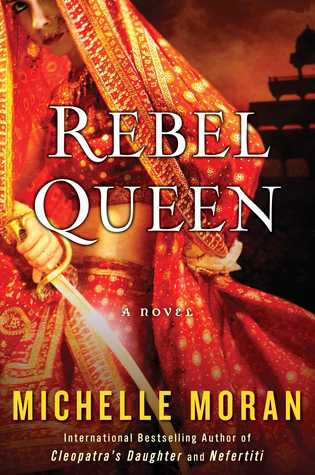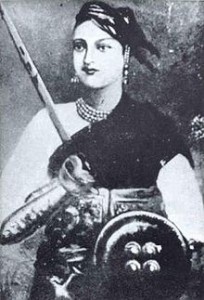 Format read: hardcover provided by the publisher
Format read: hardcover provided by the publisherFormats available: hardcover, paperback, ebook, audiobook
Genre: historical fiction
Length: 355 pages
Publisher: Touchstone
Date Released: March 3, 2015
Purchasing Info: Author’s Website, Publisher’s Website, Goodreads, Amazon, Barnes & Noble, Kobo, Book Depository
When the British Empire sets its sights on India in the 1850s, it expects a quick and easy conquest. After all, India is not even a country, but a collection of kingdoms on the subcontinent. But when the British arrive in the Kingdom of Jhansi, expecting its queen to forfeit her crown, they are met with a surprise. Instead of surrendering, Queen Lakshmi raises two armies—one male, one female—and rides into battle like Joan of Arc. Although her soldiers are little match against superior British weaponry and training, Lakshmi fights against an empire determined to take away the land she loves.
Told from the perspective of Sita, one of the guards in Lakshmi’s all-female army and the queen’s most trusted warrior, The Last Queen of India traces the astonishing tale of a fearless ruler making her way in a world dominated by men. In the tradition of her bestselling novel Nefertiti, which Diana Gabaldon, author of the Outlander series, called “a heroic story with a very human heart,” Michelle Moran once again brings a time and place rarely explored in historical fiction to rich, vibrant life.
My Review:
The Rebel Queen is the very best kind of historical fiction. Even though it is more than possible to find out how the story ends, the reader still hopes against hope that the protagonist will succeed. But history has already been written, and the ending is all too clear.
The story of the Rani of Jhansi is one where it is obvious that history is written by the victors. Because this is a story of the dark side of British colonialism and British imperialism. Their paternalistic treatment of any culture other than their own, and their firm belief that the world belonged to them, rode roughshod over the peoples and the beliefs that they ground under their conquering heel.
There is an underlying story here of economic conquest, native suppression and political storytelling spin that surprisingly echoes the completely fictional story in The Traitor Baru Cormorant by Seth Dickinson (reviewed at The Book Pushers)
The ways of empire are universal. And often fairly disgusting.
In The Rebel Queen we see the years leading up the Indian Rebellion of 1857 (sometimes called The Sepoy Rebellion) through the eyes of Sati, one of the female bodyguards of the Rani Lakshmi of Jhani. The Rani’s female guard contingent really did exist, and their function was as described, to protect the Rani and to keep her entertained.

The Rani was also as portrayed in the novel. Her husband left the governance of his province to her, while he spent outrageous sums of money to fund his never-ending desire to act in the theater, always taking the women’s parts and appearing more as a woman than a man. Their role reversal was outrageous for the time, and yet her governance of the province was respected.
Whether the Raja was gay or trans is a question that contemporary readers will ask, but the answer is not known. What is clear is that the Rani had to go to extraordinary measures to finally bear an heir to the province. This was necessary because the British had enacted a law, and had the force to make it stick, than any province with no male heir became part of the British protectorate. Considering that England at the time was ruled by Queen Victoria because there had been no male heirs to that throne, this was fairly blatant hypocrisy – but the British East India Company had the soldiers to make their decrees law.
When the heir to Jhani died, and his father the Raja followed not long after, the Rani found herself in the position of appealing to Queen Victoria to keep her throne. In the midst of the British desire to become an empire, with India as the “jewel in the crown”, the Rani’s pleas were doomed to failure.
And as we see in the story, the overthrow of Jhansi was part of a deliberate campaign on the part of the British to foment a rebellion in India, so that they could swoop in and claim that their military campaign was to restore order. The political spin was masterful.
In the middle of this story of increasing tension and the drive for war, we have the contrast of an enlightened court that recognized the intelligence and perspicacity of not just one exceptional woman, but all the women that she gathered around herself. In the story, this is contrasted by the life of the guard Sita in her home village before she came to court, and the tyranny of her grandmother over her life in purdah.
Some parts of her culture favored Sita, especially after she became a Rani’s guard, but many parts did not. Even so, we are left with the question of whether the British had the right to break her country and attempt to remake it to their own ends.
Some of the atrocities committed by both sides in the Rebellion will chill readers. But the story provides a context that the official histories have frequently lacked. In the end, as the story concludes with Sita many years later reflecting on the past, we see the cost to her and to the life and people that she loved.
Escape Rating A: This was an amazing story, which carried all the more resonance because it is so firmly based in history. And even though you know what’s coming, you still hope for a better ending than history gave these women.
I liked the way that the author used the character of Sita to relate events, rather than the perspective of the Rani. Sita is an outsider, from a small village, and comes to the court with fresh eyes. She is educated but has no experience of the court, so she sees both its beauty and the sometimes rotten heart within.
By using Sita as the point of view, we are also able to see into the barracks and inner workings of the guardswomen. We also get to observe the petty behaviors, jealous rivalries and the disruptive prejudices among this group of women who have to work together, but have nothing in common and often despise each other for reasons of caste or background.
Occasionally, the small-minded and extremely petty snits and slights feel like they take away from the story, but in the end, the small things mirror much larger concerns. While it sometimes feels like the nastiness of a fictional schoolroom, it also shows that while the Rani may have planned on keeping her friends close and her enemies close, she often confused proximity for friendship and mistook which was which. She trusted the wrong people, and they betrayed her.
But my comment about the schoolroom bullying atmosphere of the guards’ barracks is one small quibble of what was overall a marvelous book. The story of The Rebel Queen illuminates a piece of history that we sort of think we know in a way that tells a marvelous story and shines a glaring light on the dark shadows of the making of empire.


